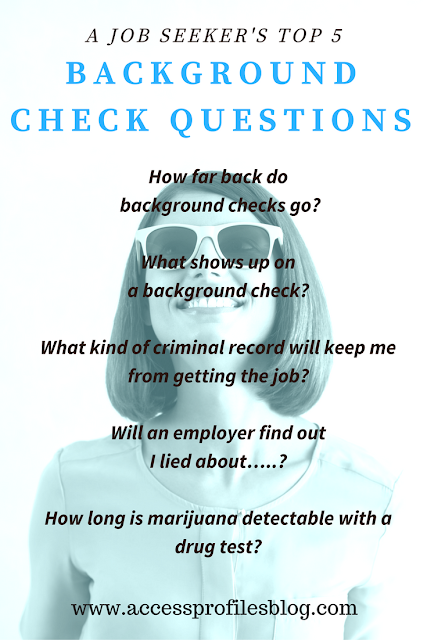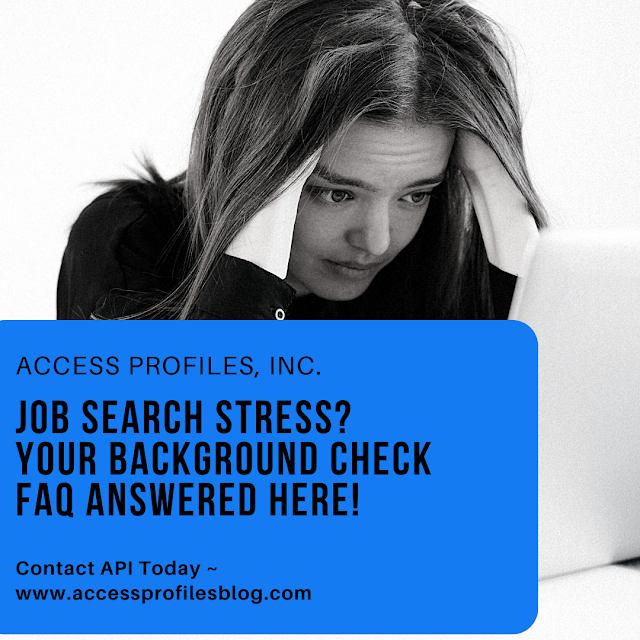.png)
Nothing gives job seekers pause more than the
employment background check.
And no wonder! Looking for a job is a nerve wracking and anxious time ~ and the thought of an employer scrutinizing you and your past just adds to the stress.Even if you have nothing to hide, you can feel anxiety about the whole background check process.
You might spend time wondering “What is an employer looking for?” and “What will they discover?”.
You are not alone!
Many job seekers have the same questions when it comes to employment screening. By focusing on 5 of those most frequently asked, we hope to provide the answers you need and help alleviate some of the stress that can drive you crazy while you search for your dream job.
Feeling Job Search Stress? Your Background Check FAQ Answered! “Tweet This”
 |
| Created by Kimberly Kline, API |
Job Seekers’ Top 5 Background Check Questions
- How far back do employment background checks go?
This can vary depending on the industry. Some companies, by law, are required to search for your entire past criminal and work history. Examples of this are jobs in finance, working with children, the elderly, or disabled, and in the transportation industry.
While these guidelines do dictate how far back to go in searching for your criminal offenses, there are none when it comes to past employments, education, etc. An employer is free to go back as far as they deem necessary.
- What Shows Up on a Background Check?
However, when most job seekers ask this question, they are really thinking about the criminal check. The 7 -10 year rule applies here too (with the exception of the regulated industries). This means that criminal offenses beyond that parameter are not supposed to be considered ~ whether they “show up” or not.
If the background check is done internally, HR should follow this guideline. If it is outsourced to a reputable screening company, then only those offenses that fall within the time parameters should be reported.
Court records are most often checked at the county and state level. Federal court records may also be requested.
During a criminal check, cases will be found that resulted in both findings of not guilty and those where you were convicted. Even cases that were dismissed or are currently active (with no disposition) are uncovered. Traffic cases are rarely considered (unless a company car or driving is part of the job description).
Beyond the criminal check, the following information will be discovered if requested by the employer:
Education ~ dates of graduation and degree earned are most common. Class rank or GPA (QPA) are not usually requested.
Employments ~ dates (start to end) and title of your most recent position are checked. Your reason for leaving is also commonly asked.
When it comes to wondering what will “show up” during the background check, there are steps you can take to help alleviate your concerns.
Making sure your resume is “background check ready” is a great way to start. Verifying that all the information listed is true and accurate is key.
Discover tips on how to get your resume background check proof here!
Getting a background check on yourself before you even apply for a job is also a smart move. Knowing in advance that nothing will be uncovered that could keep you from getting the job simply makes sense.
Find out more in “Why You Should Run a Background Check on Yourself”!
- What kind of Criminal Record will keep me from getting the job?
For many employers, felony convictions are automatic red flags. Also of concern is any past criminal activity that may jeopardize the safety of their customers, employees, and their assets.
Convictions for violent offenses are especially problematic. But, depending on the job, guilty verdicts for crimes like embezzlement, drug trafficking, or theft may also effect whether you get the job.
Even if a record is found, you have rights.There are definitive steps that an employer must take if they are considering not hiring you because of your criminal history. These include notifying you (in writing) if adverse information was found in your background check and giving you the chance to deny or mitigate those findings.
Learn more about your rights here!
It is important to note that not all employers will automatically eliminate you from consideration if you have a criminal record. EEOC guidelines actually recommend that employers only take into account offenses that directly pertain to the job.
But if you do have a criminal past, your best defense is to be ready to plead your case. Own your criminal past, share any circumstances that lead to your conviction, and show what you have done since then to turn your life around.
- Will an employer find out I lied about…..
More and more employers are doing employment background checks. And be assured, these screeners know what they are doing. Your lies will be found out. When that happens, you lose. According to employers, resume lies can actually cost you the job!
The most common resume lies:
- Skills & Responsibilities
- Degree / Diploma
- Dates of Employment
- Job Title
- Past Employers
Read more about what happens when your resume lies are discovered in “Employers Share ~ Lie on Your Resume and You Lose!”.

- How long is Marijuana detectable with a drug test?
It is important to know that employers still have the right to require a “drug free” workplace. This includes using drug tests to deny employment or fire anyone that is impaired.
To that end, many employers require pre-employment drug tests. And many others also practice random drug tests of current employees.
The length of time that marijuana will stay in your system can vary. It depends on the kind of test used, how long since you last used, how often you use, and your own body.
Marijuana use becomes slightly more problematic when approved for medical use. Employers cannot discriminate against employees who test positive for marijuana when it is prescribed by a physician. However, employers in many states are still allowed to reprimand employees who are impaired on the job, even if it is due to medically prescribed marijuana.
It is also important to remember that marijuana use is still illegal under federal law. Any employer that receives federal funding, or is subject to federal regulations, is required to consider marijuana a prohibited substance.
Find out more about Marijuana and the Workplace in “Marijuana, Employers, and Drug Testing ~ What You Need to Know”.
Knowing what questions job seekers have about background checks is valuable for employers too.
It gives them the opportunity to put their applicants at ease and make the hiring process much less stressful. It also allows an employer to establish an open and honest channel of communication with their potential new hires from the start.Learn more in “Ready to Hire? What Your Applicant Needs to Know”!
Knowing the answers to these top 5 FAQ
employment background check questions will help you start your job search with your eyes wide open. But, most importantly, by following these tips, you will be fully prepared to sail smoothly through the entire process.
Do You have a question about Hiring or Background Checks that was not covered? Or do you need more information? Contact Us Now! API can help!
Authored by

Be sure to check out our FAQ page to find out what you need to know about Hiring and Background Checks!

Discover more About Us and our Background Investigation, Business Mentoring, and Security Consulting services too!
No comments:
Post a Comment
Thanks for visiting our website. Contact Us! We can answer your questions and offer you a consultation on how we can help You with your Hiring, Business, and Security Needs!
We also invite you to Subscribe. Just leave your email and you will get one new article each month with tips and information focused on You and Your Business!